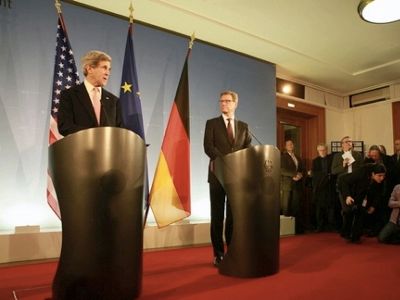 |
| Press Conference of John Kerry and Guido Westerwelle in Berlin, February 26. |
 Their architecture harkens back to a very old project of creating a
vast capitalist bloc uniting all States under Anglo-American influence.
We can find traces of this in the secret clauses of the Marshall Plan
and especially in the North Atlantic Treaty (Article 2). That is why no differentiation is made between the transatlantic union and the NATO economy.
Their architecture harkens back to a very old project of creating a
vast capitalist bloc uniting all States under Anglo-American influence.
We can find traces of this in the secret clauses of the Marshall Plan
and especially in the North Atlantic Treaty (Article 2). That is why no differentiation is made between the transatlantic union and the NATO economy.In economic matters, the idea is to repeal tariffs and non-tariff barriers, that is to say local standards that render certain imports impossible. Washington wants to quietly sell its GMOs in Europe, its chickens treated with chlorine, and its hormone-laced beef. It wants to mine data from Facebook and Google etc. without being hampered by privacy protections.
From this point of view, it is significant to note that, on the U.S. side, this project is not monitored by the Commerce Department but by the National Security Council.
We have a glimpse of the transatlantic union’s mode of operation by observing how conflicts were resolved concerning the sharing of personal data. Europeans have very demanding standards for the protection of privacy, while American officialdom can do anything it wants using the fight against terrorism as a justification.
After shuttling back and forth, Europeans are laying down as the Americans have imposed their one-way model:

the Americans copy European data, while the Europeans have no access to US data.
New Secretary of State John Kerry’s first contacts were not devoted to the Asia pivot (transfer of U.S. forces to the Far East) or the partition plan for the Middle East, but to the creation of a NATO economy, without arousing the slightest concern in Europe. However, should it be implemented quickly, this project would solve the economic crisis in the United States at the expense of Europeans.
No comments:
Post a Comment